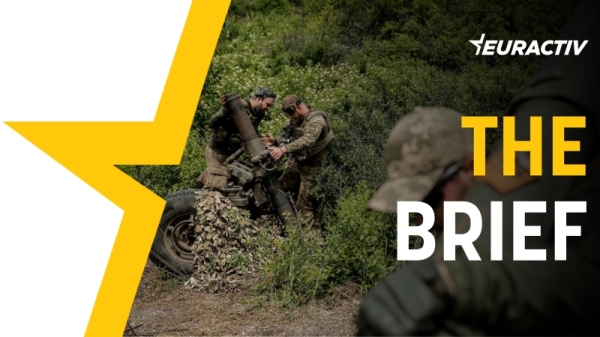The Brief — Ukraine’s summer of reckoning

The clock is ticking for Ukraine: It will need to show whether it can reclaim Russian-occupied territories with Western weapons by autumn. After that, Western attention could start to falter.
So far, Russia has had little success with their attacks around Bakhmut. On the contrary, it is facing a two-day incursion from Ukraine into Russia’s western borderlands near Belgorod.
Current developments on the battlefield and a delayed Ukrainian offensive add to the possibility that the war may not end in 2023.
Likewise, the lack of significant gains on either side will dictate the scope of diplomacy. There is currently a lack of negotiating power, with both sides unlikely to resort to such a step.
Ukrainians will not back down from their basic precondition for talks – that they must regain control of all parts of their country as per pre-2014, including the Donbas and Crimea.
Russians are also unlikely to withdraw or step back from their narrative that all occupied territories remain under Moscow’s control.
In translation, there will be no middle ground.
Ukraine’s Western supporters have understood by now that there is no prospect of a negotiated peace until Ukrainians significantly improve their position.
All eyes now are on Ukraine’s delayed spring-turned-summer offensive.
Late last summer, Ukraine proved that in Kherson and the east, around Kharkiv, it could re-gain territory quickly with a boost of Western military aid.
If they can repeat a similar push this year, Western military aid is unlikely to falter as Western governments can then justify to their citizens that the expensive support is worthwhile.
Although Western officials might not want to admit it, the “as long as it takes” might have an unspoken sunset clause.
This is especially true considering the elections of Ukraine’s key Western allies next year – the United States as the key arms supplier and the European Union as the key diplomatic advocate.
The spectre of the US election looms especially large over Ukraine’s anticipated counteroffensive.
Prominent Republicans preparing to challenge President Joe Biden have mooted a plan that would see Ukraine seize territory from Russia in exchange for a dirty peace deal.
The fear is that a cease-fire, pushed by the likes of China and Hungary, would only create a frozen conflict, pausing the existing lines and giving Russia more chance to regroup its battle-stricken forces.
But Ukrainian officials admit privately that gaining ground is now much more difficult than in last year’s successful late-summer offensive.
Ukrainians had pushed back the Russians in a war of movement that left Russians no time to build new defence lines.
However, Russians have now dug into their positions after a long winter and delayed the Ukrainian spring offensive.
In addition, Kyiv is struggling with ammunition shortages and a lack of strategic long-range missiles that, in the long-term, could help them retake and hold Crimea, which military experts say is key for guaranteeing the future security of the country.
Ukraine receiving training on Western-made F-16 fighter jets – and effectively receiving the hardware – could be a game changer to securing the air space and the upper hand over Russians.
But with the war well into its second year, the bottom line remains: No one knows how or when this will end.
The Roundup
The European Parliament plans to cut by 50% its pensions programme for former lawmakers in a bid to reduce the pension fund’s deficit from €310 million to €86 million, following an agreement by the Parliament’s leadership on Monday evening.
The cabinets of Commission Vice President Frans Timmermans and Environment Commissioner Virginijus Sinkevičius have been holding one-on-one meetings with EU lawmakers to get them on board with the EU executive’s pesticide-cutting and nature restoration proposals, MEPs told EURACTIV.
EU agriculture lawmakers have approved their opinion on the EU’s nature restoration law which rejects the whole proposal, effectively leaving the agriculture committee ‘without a voice’ in the final draft.
A reform of the rules governing the EU’s trade in construction products has won crucial backing from the European Parliament’s internal market committee, but with environmentalists complaining it was too soft on industry demands.
Europe’s second-highest court backed today budget carrier Ryanair’s challenge against Italian state aid, approved by the European Union, for airlines hit by the COVID-19 pandemic, siding again with the Irish airline.
EU defence ministers adopted on Tuesday conclusions on cyber defence, pointing out the need to avoid duplications in the institutional architecture, and stating their priorities on skills development and voluntary coordination in the defence sector.
Ukraine accused Russia on Tuesday of effectively cutting the Ukrainian port of Pivdennyi out of a deal allowing safe Black Sea grain exports as Russia complained that it had been unable to export ammonia via a pipeline to Pivdennyi under the pact.
Don’t forget to check out this week’s Health Brief: Building communities to fight loneliness.
Look out for…
- Foreign Affairs Council (Trade)
- Justice Commissioner Didier Reynders receives Fredrik Persson, president of Business Europe.
- Commission Vice-President Frans Timmermans meets with government representatives, stakeholders, civil society to prepare COP28 UN Climate Change Conference.



